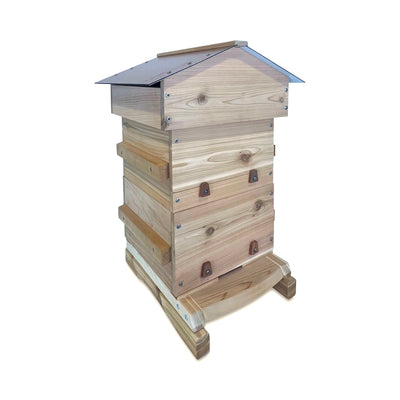From the Beekeeper's Desk

- Varroa mite on a honey bee.
Beekeeping is like any faction of agriculture. Just as there are a hundred ways to grow carrots, there are hundreds of ways to keep bees, given the available components and philosophies. With this in mind, there is a surprising phenomenon beekeepers encounter early on when they become new beekeepers which is extreme prejudice, peer pressure, and mockery if they choose a path other than using commercial-type Langstroth hives and treatments. To explain this further, I need to take a side-step and head down a small, well-worn rabbit hole...
Commercial beekeepers are in a supremely difficult position. A great example of the epic issues with monoculture are exemplified in the over 800,000 acres of almond trees in California. It's only a small exaggeration to say that almost all of the managed beehives in the U.S. are trucked out to the almonds to pollinate them each year in February. The reason bees cannot be kept in the almonds year-round is alarmingly simple: nothing else is planted. There would be nothing else for bees to eat or forage upon during the rest of the year and they would starve. Aside from almonds, the land is a desert.
Aside from the obvious problems with this example of monoculture, the greater issue for honeybees is that they are all trucked to this one area where they then share pests, diseases, and genetics before they are driven back to their home communities where they then share them there. While the many causes for Colony Collapse Disorder are still being identified, it cannot be ignored that CCD is an ongoing tragedy of shocking proportions. Commercial beekeepers need to feed their families and try and preserve their businesses. To attempt to keep their colonies alive, they have little other option than to medicate and treat their bees with chemicals at sometimes alarming rates. As food consumers, we depend upon their bees and as business owners, commercial beekeepers depend upon their bees.
In past years, we have met a handful of commercial beekeepers. I have yet to meet one that doesn't bemoan how they have to keep, and treat their bees, in attempts to keep the colonies thriving. Commercial beekeepers are in the difficult position of what they must do to try and save their livelihood, what industrial agriculture demands of them and their honeybees, and what they wish were the reality as beekeepers. The commercial beekeepers I have met wish they were in the position that I am, as a hobby beekeeper. I'm in a luxurious position in that I can develop my own philosophy by trial and error. I get to tow a hard line; I don't ever treat my bees, with anything... natural or not, I let my weak colonies die off and repopulate from my strongest, I have gotten my losses down to 15-20% over the last 6 years, my livelihood isn't being threatened from every angle by a witch's brew of pesticides, diseases, and industrial agriculture.
So it is odd then that when folks begin beekeeping now days, they should immediately run into an old-guard of side-line and hobby beekeepers, at community beekeeping groups and forums, that attempt to minimize and mock them if they are attempting to do things more naturally, and differently -- from choosing easier-to-use hive styles that give the bees an experience more like that they might have in nature, to not treating with chemical medications and miticides. We know that commercial beekeepers have little choice about the way they keep bees, but as side-line beekeepers, we are not constrained to box-type hive styles that need to be easily stacked and trucked around the country. If we lose our colonies, our families don't have to tighten their belts and change their lifestyle.
If commericial beekeepers are envious of the hobby and side-line beekeeper's many choices and available beekeeping philosophy decisions, why is this old guard so threatened? And more importantly, why are they attempting to qualify and judge someone else's interest in beekeeping? After all, aren't we all in it for the bees? And if what we have been doing the same way for the last hundred years is no longer working, isn't it time to change what we are doing? And quickly?
Here is an article about the almonds and bee losses from earlier this year: http://www.nytimes.com/






Leave a comment